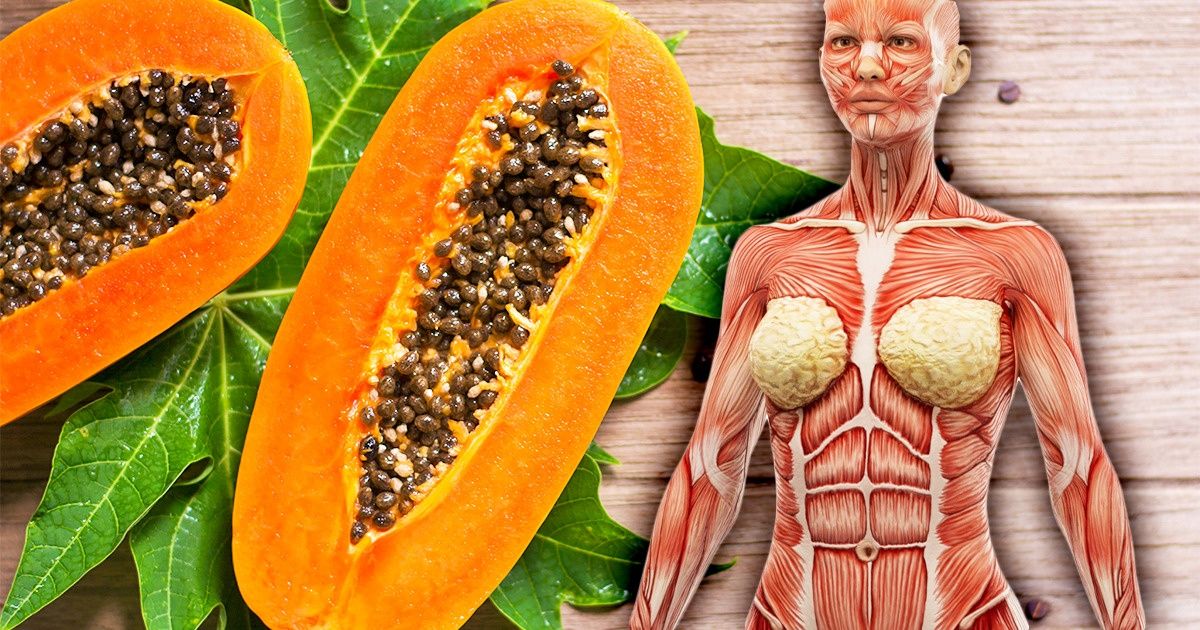Breakfast is often hailed as the most important meal of the day, but what you eat in the morning can make or break your energy levels, metabolism, and overall health. While some foods fuel your body for success, others set you up for energy crashes, cravings, and digestive discomfort. To help you make smarter choices, we’ve compiled a list of 6 foods to avoid before 10 AM—and what to eat instead.
Healthy Things Nutritionists Do Before 10 A.M
6. Buttered Toast: A High-Calorie Trap With Hidden Risks
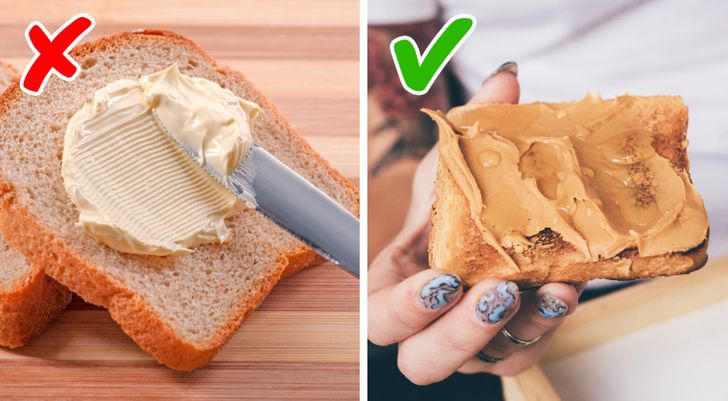
Why Buttered Toast Is a Problematic Morning Choice
Buttered toast is a breakfast staple for many, but its combination of refined carbohydrates and saturated fats can sabotage your health goals. White bread lacks fiber and causes rapid spikes in blood sugar, while butter adds unnecessary saturated fat. According to a Harvard Health study, refined carbs like white bread are linked to increased hunger and weight gain.
Healthier Alternatives to Buttered Toast
Oatmeal topped with nuts and seeds for sustained energy.
Whole-grain or sourdough toast with avocado or almond butter for healthy fats.
5. Sugary Cereals and Small Flakes: The Breakfast Sugar Bomb
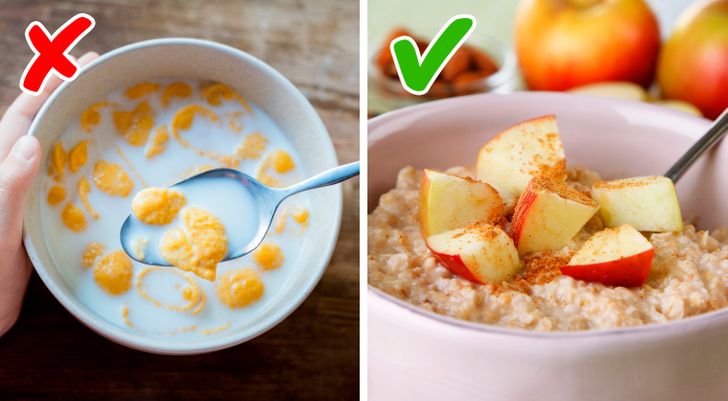
The Hidden Dangers of “Healthy” Breakfast Cereals
Many cereals marketed as “whole grain” or “fortified” are loaded with added sugars. For example, popular “small flakes” often contain up to 12 grams of sugar per serving. The American Heart Association warns that excess sugar intake increases the risk of obesity and heart disease.
Better Breakfast Cereal Choices
DIY granola with oats, nuts, and a touch of honey.
Low-sugar, high-fiber cereals like bran flakes or shredded wheat.
4. Pancakes and Waffles to Go: Empty Calories in Disguise
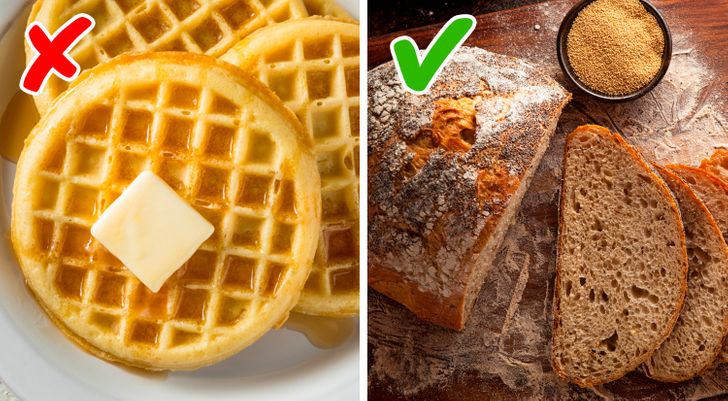
Why Pancakes and Waffles Derail Your Morning
Store-bought pancakes, waffles, and toaster pastries are often made with refined flour and syrups high in fructose corn syrup. These ingredients cause blood sugar crashes and leave you craving more carbs. A study in The BMJ links ultra-processed foods to overeating and weight gain.
Nutritious Swaps for Pancakes and Waffles
Whole-grain waffles topped with Greek yogurt and berries.
Protein pancakes made with banana, eggs, and oat flour.
3. Low-Fat Yogurt: A Misleading “Healthy” Option
The Sugar Trap in Low-Fat and Flavored Yogurts
Low-fat yogurts often compensate for reduced fat by adding sugars or artificial sweeteners. A single cup of flavored yogurt can contain up to 20 grams of sugar—nearly half the daily recommended limit. Research from PubMed Central shows that high sugar intake disrupts gut health and promotes inflammation.
Gut-Friendly Yogurt Alternatives
Dairy-free options like unsweetened coconut or almond milk yogurt.
Plain Greek yogurt with fresh fruit and a drizzle of honey.
2. Grab-and-Go Fruit Juice: Liquid Sugar in a Bottle
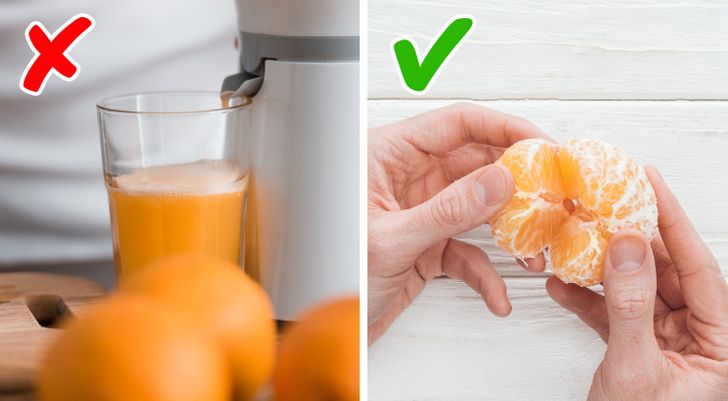
Why Fruit Juice Is Worse Than Whole Fruit
Even 100% fruit juice lacks the fiber found in whole fruits, leading to rapid sugar absorption. A 12-ounce glass of orange juice contains 36 grams of sugar—equivalent to a can of soda. The Mayo Clinic advises limiting juice intake to avoid blood sugar spikes.
Hydrating and Nutritious Morning Drinks
Green smoothies blending spinach, banana, and almond milk.
Infused water with cucumber, lemon, or mint.
1. High-FODMAP Foods: Digestive Disasters Before Noon

How FODMAPs Cause Morning Bloating and Discomfort
Foods high in fermentable oligosaccharides, disaccharides, monosaccharides, and polyols (FODMAPs)—like apples, garlic, or wheat—can trigger bloating and IBS symptoms. A Monash University study confirms that 70% of IBS patients benefit from a low-FODMAP diet.
Low-FODMAP Breakfast Ideas
Gluten-free toast with peanut butter and sliced strawberries.
Scrambled eggs with spinach and lactose-free cheese.
Final Tips for a Healthier Morning Routine
- Prioritize protein and fiber to stabilize blood sugar (e.g., eggs, chia pudding).
- Hydrate first thing with water or herbal tea to kickstart metabolism.
- Prep breakfast ahead to avoid relying on processed convenience foods.
By avoiding these six foods and choosing nutrient-dense alternatives, you’ll set the tone for a productive, energized day. For more science-backed nutrition tips, explore resources from Healthline and the Academy of Nutrition and Dietetics.

